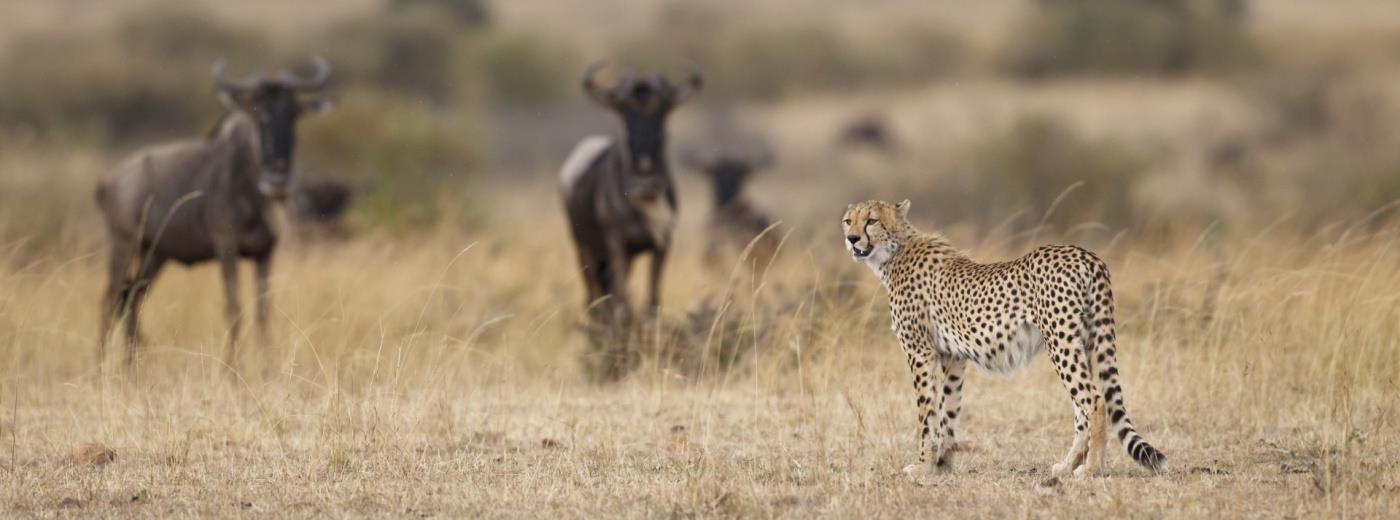All you need to know for your holiday to Kenya
Covid-19 Travel Alerts
CURRENT ENTRY RULES IN RESPONSE TO CORONAVIRUS (COVID-19) - Updated 12 May 2023:
Entry to Kenya - All Travellers
From 9 May 2023 the Government of Kenya no longer requires proof of either COVID-19 vaccination or a negative COVID-19 PCR test for entry into Kenya.
Travellers with flu-like symptoms, will be required to undergo a rapid antigen test at their own cost of 30 USD. Those who test positive on antigen RDT will be required to take a PCR test at their own cost of 50 USD and self-isolate as per Ministry of Health guidance on isolation. Those with severe symptoms shall then be allowed to isolate as per the prevailing isolation requirements for mild, moderate and severe disease.
Any traveller entering Kenya with flu-like symptoms will be required to fill the passenger locator form on the ‘jitenge’ platform: https://ears.health.go.ke/airline_registration/ and may be asked to undergo a rapid antigen test at their own cost regardless of age or vaccination status.
Full details of the Government of Kenya’s entry requirements in relation to coronavirus can be found on the Kenya Civil Aviation Authority website: https://www.kcaa.or.ke/covid-19
Departing Kenya
When leaving Kenya, you will be required to show compliance with entry requirements for your destination country and any transit countries. UK citizens can use the UK’s proof of COVID-19 recovery and vaccination record if you are required to demonstrate your vaccination record when leaving Kenya.
It is expected that these rules will be lifted and that the entry requirements will revert to normal as soon as the government of Kenya deems it safe to do so.
Passport And Visa Requirents
Latest Travel Updates
For up-to-date travel information from the UK government, please check:
UK Government Advice: www.gov.uk/foreign-travel-advice/kenya
Kenya is visa free but visitors need to apply and pay for an electronic Travel Authorisation (eTA) in advance of travel - please follow this link to make your online application:
All passengers travelling through Kenya who do not need to clear Immigration and Customs are exempt from this requirement.
Some other exemptions apply and can be found in full on the website of the Kenyan Civil Aviation Authority.
Your passport should also be valid for a minimum period of 6 months from the date of entry into Kenya. Make sure you have 2 blank pages in your passport on arrival.
Please note: We do NOT advise getting the East Africa Tourist Visa if your trip also includes Rwanda and/or Uganda as this can cause problems at point of entry.
PLEASE NOTE: Countries can change their entry requirements at any time. Travel Butlers try to ensure that the information displayed here is correct, but the onus remains with the traveller to verify the information with the relevant High Commission or Embassy and ensure that they can comply with the applicable entry requirements.
Medical Considerations
You are advised to contact your doctor or clinic around 4-8 weeks before your trip to check whether you need any vaccinations and to get their professional medical advice regarding travel to Kenya.
To help prevent diarrhoea, avoid tap water – drink only bottled water and use bottled water for tooth brushing, and avoid ice made with tap water – and only eat fruit or vegetables that are cooked or can be peeled.
To help avoid heatstroke, drink plenty of bottled water/fluids, and keep out of the midday sun.
There is a risk of malaria in all areas of Kenya, except Nairobi and the highlands - check with your doctor about suitable antimalarial tablets. Dengue fever can also be transmitted via mosquito bites. Try to avoid mosquito bites wherever possible - wear loose long-sleeved clothing and trousers, and use a repellent on clothing and exposed skin.
Kenya falls into the yellow fever region in Africa. There is only a low potential for exposure to yellow fever in Nairobi, Mombasa, Lamu, Malindi and Shimba Hills National Park, but in the rest of the country there is a higher risk. It is therefore advisable for all travellers aged 9 months and older to obtain a yellow fever vaccination no less than 10 days prior to travel, but depending on the rest of your travel plans and country of origin, it is not compulsory:
Travellers from the UK who are only travelling directly to and from Kenya are currently not required to produce a vaccination certificate upon their return to the UK but this can change with no notice so do please check with your doctor and take their advice
If you are arriving into Kenya from a country which has any risk of yellow fever transmission you will be required to provide a certificate of your vaccination upon entry into Kenya. Also, certain countries including South Africa and Tanzania will deny entry if you are arriving from Kenya without the vaccination. It is up to the traveller to check the full list of countries here to ensure that you comply with these guidelines: https://nathnacyfzone.org.uk/factsheet/60/yellow-fever-maps
If your doctor advises that it is not safe for you to have the vaccination then you should obtain a medical waiver and travel with this instead.
Time Zone
Kenya Standard Time is 3 hours ahead of Greenwich Mean Time (GMT+3). Kenya does not operate Daylight-Saving Time.
Languages
English is the common commercial language, therefore it is spoken in the major towns and at all lodges and hotels. There are 52 tribes in Kenya, each with their own tribal language. The national language in Kenya is Swahili.
We would ask that all travellers are respectful of the local culture as follows:
Showing anger is not acceptable – Kenyan people pride themselves on their emotional control and expect the same in others. Try to remain patient, polite and friendly, even if the situation is very frustrating. Pointing with your finger at someone is considered very rude and is deemed to be an obscene gesture.
The coastal areas are predominantly Muslim so it is important to dress conservatively out of respect for the Muslim culture. On the beaches and within the confines of hotels, normal swimwear is acceptable but nudity/topless sunbathing is not. Away from beach resorts (especially in Mombasa, during the holy month of Ramadan or if you visit religious areas), women should avoid walking around in public areas displaying their legs and upper arms/shoulders - ‘short’ shorts, mini skirts, vests and tank tops may be frowned upon and viewed as a sign of disrespect. Long, loose hair is also seen as very provocative, so to avoid unwanted attention ladies may wish to tie their hair back or wear a headscarf.
Homosexuality is illegal in Kenya. Whilst everyone is of course entitled to their own sexual preferences and gender identity, we would advise all clients of the LGBT+ community to refrain from public displays of affection (including kissing and holding hands) and to be as discrete as possible about their relationship.
It is against the law for civilians to wear full military style clothing/attire (ie made from camouflage material).
You should always ask permission before taking anyone’s photograph. Taking photographs of official buildings, including Embassies, can lead to detention. If in any doubt, don’t photograph or film around them. Photography is also prohibited at airports.
Smoking in all public places (except in designated areas) is prohibited. Offenders can face a fine or imprisonment.
You must carry a form of ID with you at all times. A copy of your passport is normally acceptable, but recently some police officers have been insisting on the original document.
Currency
The monetary unit is the Kenyan shilling. There is no limit to the amount of currency or traveller's cheques that you can bring into the country. US dollars are widely accepted too, however, notes dated before 2001 are no longer accepted and high denomination notes may also not be accepted.
All the major Credit cards are widely accepted in the city hotels, city restaurants and city shops but this may not be the case in the rural areas or whilst on safari. A commission charge is normally added to any transactions using a credit card.
Travellers cheques may be cashed in a bank but this can be a somewhat lengthy process.
The smaller safari lodges and camps or rural hotels may not all accept travellers cheques or credit cards and where they do they may give an unfavourable exchange rate or add a surcharge, so it is recommended that you obtain whatever local currency you may need on safari in advance by drawing cash from an ATM at a bank in Nairobi or there is a bank at Jomo Kenyatta International Airport which is located in the far corner of the Baggage hall, so you can obtain money while waiting for your luggage to come through.
Reverting your Kenyan shillings into hard currency is easily done at the airport, hotels and banks. The rate of exchange varies between banks, foreign exchange bureaus and hotels. Do NOT change money on the black market, or destroy Kenyan currency as both acts are illegal.
Electricity
Voltage in Kenya is 240 volts, and plugs are generally square 3-pin UK style. In some properties power is only available in the early morning and evening, and some do not have power points in the rooms/tents. Where power points are not available, there will be charging facilities for cameras, phones and computers in the main areas.
Water
Hotels and lodges supply clean drinking water but whenever in doubt, please drink only bottled mineral water (which is available in hotels and safari camps). Drinking water from the tap is not encouraged.
Phones
The international dialling code for Kenya is +254. Most areas of Kenya have some form of mobile phone network, however it is often weak or unreliable, so please do not always rely on it.

